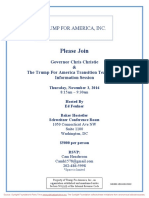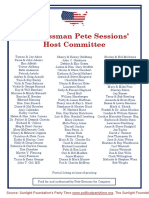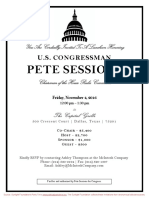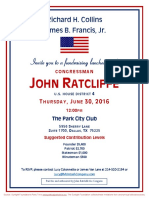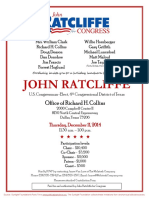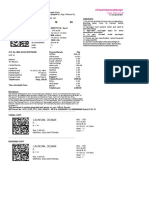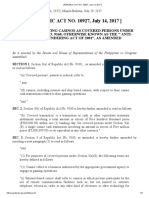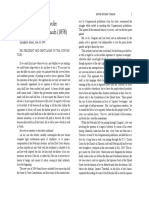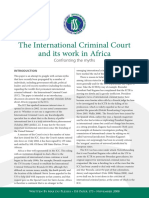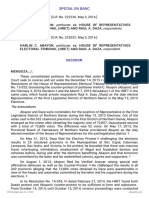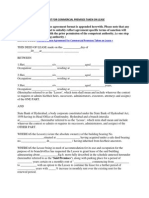Professional Documents
Culture Documents
Sunlight Foundation Letter To FCC On Broadcast Rules
Uploaded by
Sunlight FoundationOriginal Title
Copyright
Available Formats
Share this document
Did you find this document useful?
Is this content inappropriate?
Report this DocumentCopyright:
Available Formats
Sunlight Foundation Letter To FCC On Broadcast Rules
Uploaded by
Sunlight FoundationCopyright:
Available Formats
April 20, 2012 The Honorable Julius Genachowski Chairman Federal Communications Commission 445 Twelfth Street, SW Washington,
DC 20554 Via Federal Communications Commission Electronic Comment Filing System (ECFS) http://fjallfoss.fcc.gov/ecfs/ Re: FCC Rulemaking, MB Docket Nos. 00-168; 00-44; FCC 11-162, Standardized and Enhanced Disclosure Requirements for Television Broadcast Licensee Public Interest Obligations. Dear Chairman Genachowski: The Sunlight Foundation is a non-profit, nonpartisan organization that uses the power of the Internet to catalyze greater government openness and transparency. We are committed to improving access to government information by making it available online, redefining public information as meaning online. We strongly support the Commissions proposal to require television broadcasters to replace paper political files with an online database of information. Placing detailed information about political advertising online is fundamental to broadcasters satisfying their responsibility to serve the needs of their communities in exchange for the use of the public spectrum. Little is more fundamental to the functioning of our democracy than voters understanding of who is influencing our elections. Broadcasters are in the position of readily making this information available to the public by placing the contents of their political file online. Making public information about who is paying for political ads, which candidates the ads support or oppose, where they are being run, and how much is being spent on them has always been in the publics interest. It is currently too easy to mislead the public about the source of money behind a political ad. The Sunlight Foundation is concerned by reports that broadcasters are suggesting that by limiting the amount of information contained in the online political file, they may still satisfy their public interest obligation. Specifically, broadcasters are arguing in favor of providing only aggregate data on political advertising sales, omitting information about whether a station accepted or rejected a request to purchase time, the date and time a political advertising message aired, and the class of time purchased. The broadcasters
also appear to suggest keeping offlinein effect hidinginformation about ads purchased by non-profit organizations, including so-called super PACs, that purchase ad time for electioneering communications or making independent expenditures. The broadcasters are not entitled to cherry pick the quality or type of information to be made public. Congress mandated what information must be made publicly available in the political file. By extension, the FCC must not limit, through its rules, public access to only those members of the public who have the ability and resources to enter a broadcast station and demand to see the paper documents. In this era of ubiquitous Internet access to everything, public means online. It should be noted that the broadcasters own proposal would result in the creation of two separate filing regimes. One public file would be created on paper and stored in file cabinets and would include the complete and detailed information required by law. The second public file would be online, but would contain only aggregated and redacted information. Not only is such a proposal internally inconsistent, but it undercuts one of the main objections the broadcasters have offered in opposition to this rulemakingthat online filing would be too burdensome. We respectfully urge the Commission to create a transparent and inclusive system of online disclosure that embraces 21st Century norms and ensures that all information contained in the public file is fully accessible to the public. Sincerely, /s/ Ellen S. Miller Co-founder and Executive Director The Sunlight Foundation
You might also like
- ReceptionDocument2 pagesReceptionSunlight FoundationNo ratings yet
- FundraiserDocument2 pagesFundraiserSunlight FoundationNo ratings yet
- ReceptionDocument2 pagesReceptionSunlight FoundationNo ratings yet
- FundraiserDocument2 pagesFundraiserSunlight FoundationNo ratings yet
- Luncheon For Republican Governors AssociationDocument2 pagesLuncheon For Republican Governors AssociationSunlight FoundationNo ratings yet
- Information SessionDocument2 pagesInformation SessionSunlight FoundationNo ratings yet
- LuncheonDocument4 pagesLuncheonSunlight FoundationNo ratings yet
- FundraiserDocument1 pageFundraiserSunlight FoundationNo ratings yet
- Birthday CelebrationDocument3 pagesBirthday CelebrationSunlight FoundationNo ratings yet
- LuncheonDocument2 pagesLuncheonSunlight FoundationNo ratings yet
- Private Screening of Jason Bourne For Pete SessionsDocument2 pagesPrivate Screening of Jason Bourne For Pete SessionsSunlight FoundationNo ratings yet
- Reception For John RatcliffeDocument1 pageReception For John RatcliffeSunlight FoundationNo ratings yet
- LuncheonDocument2 pagesLuncheonSunlight FoundationNo ratings yet
- ReceptionDocument2 pagesReceptionSunlight FoundationNo ratings yet
- LuncheonDocument2 pagesLuncheonSunlight FoundationNo ratings yet
- FundraiserDocument2 pagesFundraiserSunlight FoundationNo ratings yet
- ReceptionDocument2 pagesReceptionSunlight FoundationNo ratings yet
- LuncheonDocument2 pagesLuncheonSunlight FoundationNo ratings yet
- The Subtle Art of Not Giving a F*ck: A Counterintuitive Approach to Living a Good LifeFrom EverandThe Subtle Art of Not Giving a F*ck: A Counterintuitive Approach to Living a Good LifeRating: 4 out of 5 stars4/5 (5794)
- The Little Book of Hygge: Danish Secrets to Happy LivingFrom EverandThe Little Book of Hygge: Danish Secrets to Happy LivingRating: 3.5 out of 5 stars3.5/5 (399)
- A Heartbreaking Work Of Staggering Genius: A Memoir Based on a True StoryFrom EverandA Heartbreaking Work Of Staggering Genius: A Memoir Based on a True StoryRating: 3.5 out of 5 stars3.5/5 (231)
- Hidden Figures: The American Dream and the Untold Story of the Black Women Mathematicians Who Helped Win the Space RaceFrom EverandHidden Figures: The American Dream and the Untold Story of the Black Women Mathematicians Who Helped Win the Space RaceRating: 4 out of 5 stars4/5 (894)
- The Yellow House: A Memoir (2019 National Book Award Winner)From EverandThe Yellow House: A Memoir (2019 National Book Award Winner)Rating: 4 out of 5 stars4/5 (98)
- Shoe Dog: A Memoir by the Creator of NikeFrom EverandShoe Dog: A Memoir by the Creator of NikeRating: 4.5 out of 5 stars4.5/5 (537)
- Elon Musk: Tesla, SpaceX, and the Quest for a Fantastic FutureFrom EverandElon Musk: Tesla, SpaceX, and the Quest for a Fantastic FutureRating: 4.5 out of 5 stars4.5/5 (474)
- Never Split the Difference: Negotiating As If Your Life Depended On ItFrom EverandNever Split the Difference: Negotiating As If Your Life Depended On ItRating: 4.5 out of 5 stars4.5/5 (838)
- Grit: The Power of Passion and PerseveranceFrom EverandGrit: The Power of Passion and PerseveranceRating: 4 out of 5 stars4/5 (587)
- Devil in the Grove: Thurgood Marshall, the Groveland Boys, and the Dawn of a New AmericaFrom EverandDevil in the Grove: Thurgood Marshall, the Groveland Boys, and the Dawn of a New AmericaRating: 4.5 out of 5 stars4.5/5 (265)
- The Emperor of All Maladies: A Biography of CancerFrom EverandThe Emperor of All Maladies: A Biography of CancerRating: 4.5 out of 5 stars4.5/5 (271)
- On Fire: The (Burning) Case for a Green New DealFrom EverandOn Fire: The (Burning) Case for a Green New DealRating: 4 out of 5 stars4/5 (73)
- The Hard Thing About Hard Things: Building a Business When There Are No Easy AnswersFrom EverandThe Hard Thing About Hard Things: Building a Business When There Are No Easy AnswersRating: 4.5 out of 5 stars4.5/5 (344)
- Team of Rivals: The Political Genius of Abraham LincolnFrom EverandTeam of Rivals: The Political Genius of Abraham LincolnRating: 4.5 out of 5 stars4.5/5 (234)
- The Unwinding: An Inner History of the New AmericaFrom EverandThe Unwinding: An Inner History of the New AmericaRating: 4 out of 5 stars4/5 (45)
- The World Is Flat 3.0: A Brief History of the Twenty-first CenturyFrom EverandThe World Is Flat 3.0: A Brief History of the Twenty-first CenturyRating: 3.5 out of 5 stars3.5/5 (2219)
- The Gifts of Imperfection: Let Go of Who You Think You're Supposed to Be and Embrace Who You AreFrom EverandThe Gifts of Imperfection: Let Go of Who You Think You're Supposed to Be and Embrace Who You AreRating: 4 out of 5 stars4/5 (1090)
- The Sympathizer: A Novel (Pulitzer Prize for Fiction)From EverandThe Sympathizer: A Novel (Pulitzer Prize for Fiction)Rating: 4.5 out of 5 stars4.5/5 (119)
- Her Body and Other Parties: StoriesFrom EverandHer Body and Other Parties: StoriesRating: 4 out of 5 stars4/5 (821)
- PENGEMBANGAN PASCA AMANDEME KONTITUSI Hisbun NashorDocument11 pagesPENGEMBANGAN PASCA AMANDEME KONTITUSI Hisbun Nashorإلهام البدوNo ratings yet
- Broadway Centrum Condominium Corp vs. Tropical HutDocument9 pagesBroadway Centrum Condominium Corp vs. Tropical HutVeraNataaNo ratings yet
- Constantino V CuisiaDocument2 pagesConstantino V Cuisiaatoydequit100% (1)
- 2019 New Civil ProcedureDocument47 pages2019 New Civil ProcedureJayNo ratings yet
- PwC Webinar on the Extractive Sector Transparency Measures Act (ESTMADocument40 pagesPwC Webinar on the Extractive Sector Transparency Measures Act (ESTMAShravan EtikalaNo ratings yet
- 2GO Travel - Itinerary ReceiptDocument2 pages2GO Travel - Itinerary ReceiptGeoseff Entrata100% (1)
- Palafox Vs Province of Ilocos NorteDocument3 pagesPalafox Vs Province of Ilocos NorteKrys Martinez0% (1)
- Manjača Camp Concentration Camp BosniaDocument5 pagesManjača Camp Concentration Camp Bosniababo25No ratings yet
- RA 10927 An Act Designating Casinos As Covered Persons Under RA 9160 Anti Money Laundering ActDocument4 pagesRA 10927 An Act Designating Casinos As Covered Persons Under RA 9160 Anti Money Laundering ActRMN Rommel DulaNo ratings yet
- Lincoln House Divided SpeechDocument4 pagesLincoln House Divided Speechpeterson_parkerNo ratings yet
- 01 Social Rights in The CharterDocument43 pages01 Social Rights in The CharterLich_king2No ratings yet
- Territorial JurisdictionDocument264 pagesTerritorial JurisdictionshraddhaNo ratings yet
- 19 People V Madrigal-GonzalesDocument14 pages19 People V Madrigal-GonzalesFrench TemplonuevoNo ratings yet
- IPC Nov 2019Document21 pagesIPC Nov 2019adiNo ratings yet
- California Bar Examination: February 2018 Essay Questions 1, 2 and 3Document23 pagesCalifornia Bar Examination: February 2018 Essay Questions 1, 2 and 3Trial UserNo ratings yet
- The ICC and Confronting Myths in AfricaDocument24 pagesThe ICC and Confronting Myths in AfricaWendel DamascenoNo ratings yet
- Attack The Debt CollectorDocument3 pagesAttack The Debt CollectorGabe Perazzo100% (1)
- Sample Motion To Vacate Default Judgment For Extrinsic Fraud or Mistake in CaliforniaDocument4 pagesSample Motion To Vacate Default Judgment For Extrinsic Fraud or Mistake in CaliforniaStan Burman70% (10)
- Abayon v. House of Representatives Electoral Tribunal, 791 SCRA 242 (May 3, 2016) G.R. No. 222236 PDFDocument15 pagesAbayon v. House of Representatives Electoral Tribunal, 791 SCRA 242 (May 3, 2016) G.R. No. 222236 PDFMarc YuNo ratings yet
- Taxation ProjectDocument23 pagesTaxation ProjectAkshata MasurkarNo ratings yet
- Manlapaz Vs CADocument2 pagesManlapaz Vs CAPatrick James TanNo ratings yet
- Class Topic: Political Question G.R. No. 196231 January 28, 2014Document2 pagesClass Topic: Political Question G.R. No. 196231 January 28, 2014DEAN JASPERNo ratings yet
- Ernie Allen - NCMEC - Criminal Trial - Doc 2Document7 pagesErnie Allen - NCMEC - Criminal Trial - Doc 2BrivahoNo ratings yet
- CAVB - Appointment BookingHERODEDocument2 pagesCAVB - Appointment BookingHERODEmerlinebelony16No ratings yet
- Job Completion TempDocument1 pageJob Completion Temprichard2509No ratings yet
- Global financial crisis explainedDocument2 pagesGlobal financial crisis explainedIvana JurićNo ratings yet
- Commercial Lease Agreement for Standard PremisesDocument4 pagesCommercial Lease Agreement for Standard PremisesJaidev Bhoomreddy100% (1)
- University of London La2024 ZADocument3 pagesUniversity of London La2024 ZASaydul ImranNo ratings yet
- Camarines Sur election results by cityDocument2 pagesCamarines Sur election results by cityRey PerezNo ratings yet
- Innovation and Excellence Reviwer Edjpm Lesson 5 and 6Document11 pagesInnovation and Excellence Reviwer Edjpm Lesson 5 and 6Edjon PayongayongNo ratings yet





